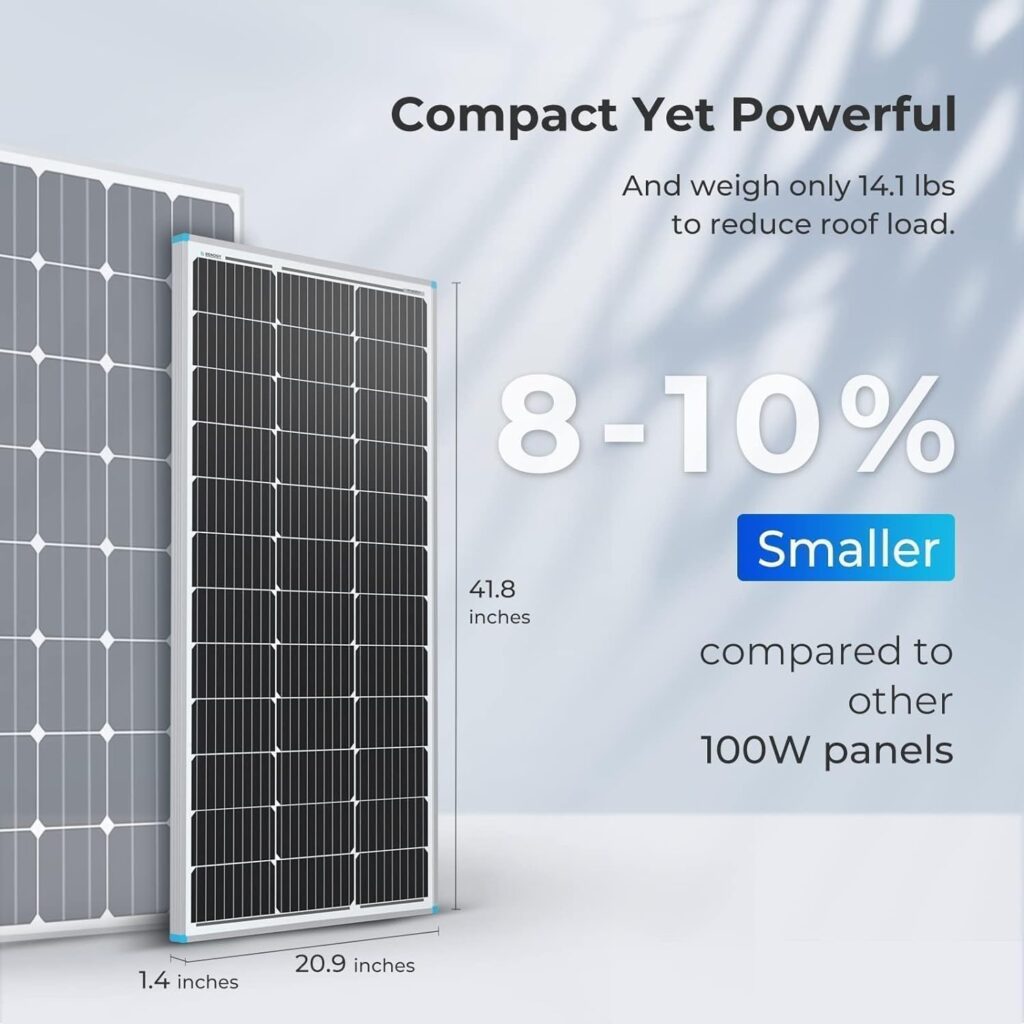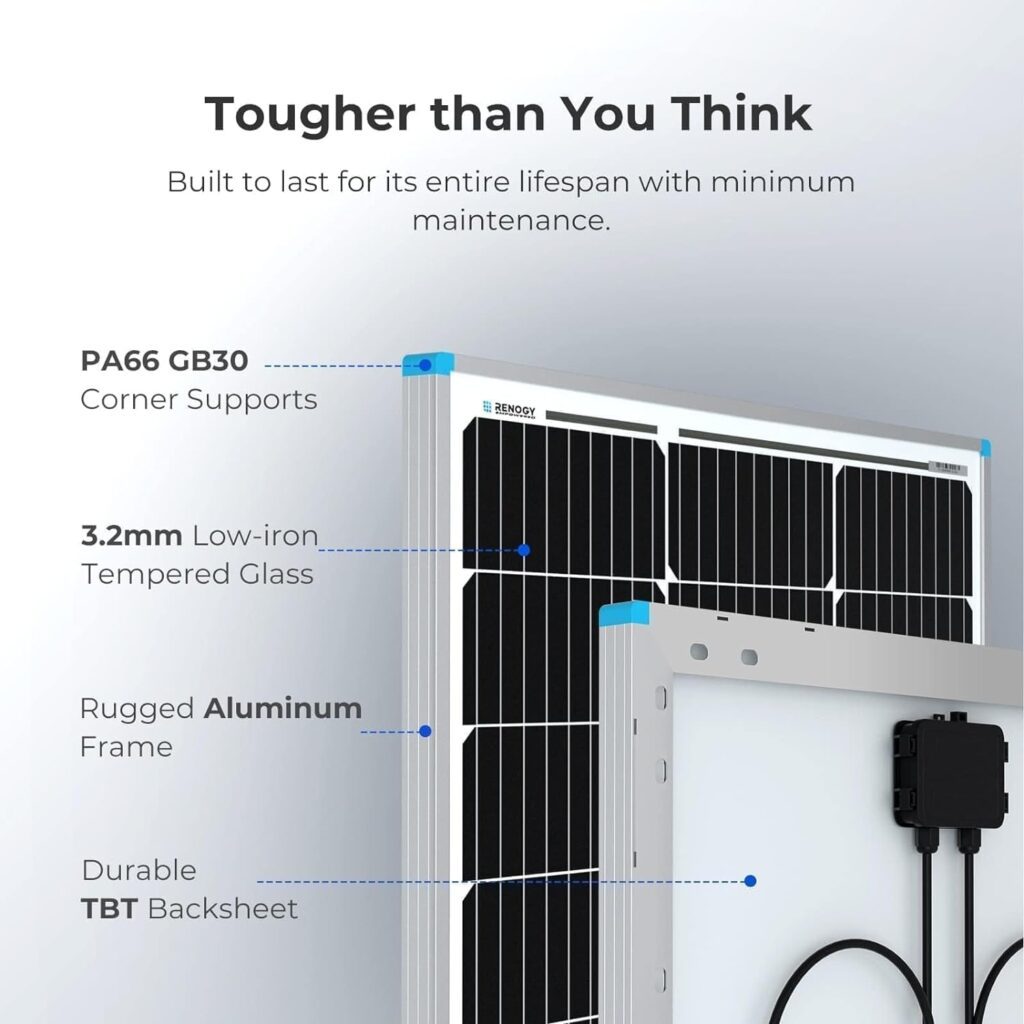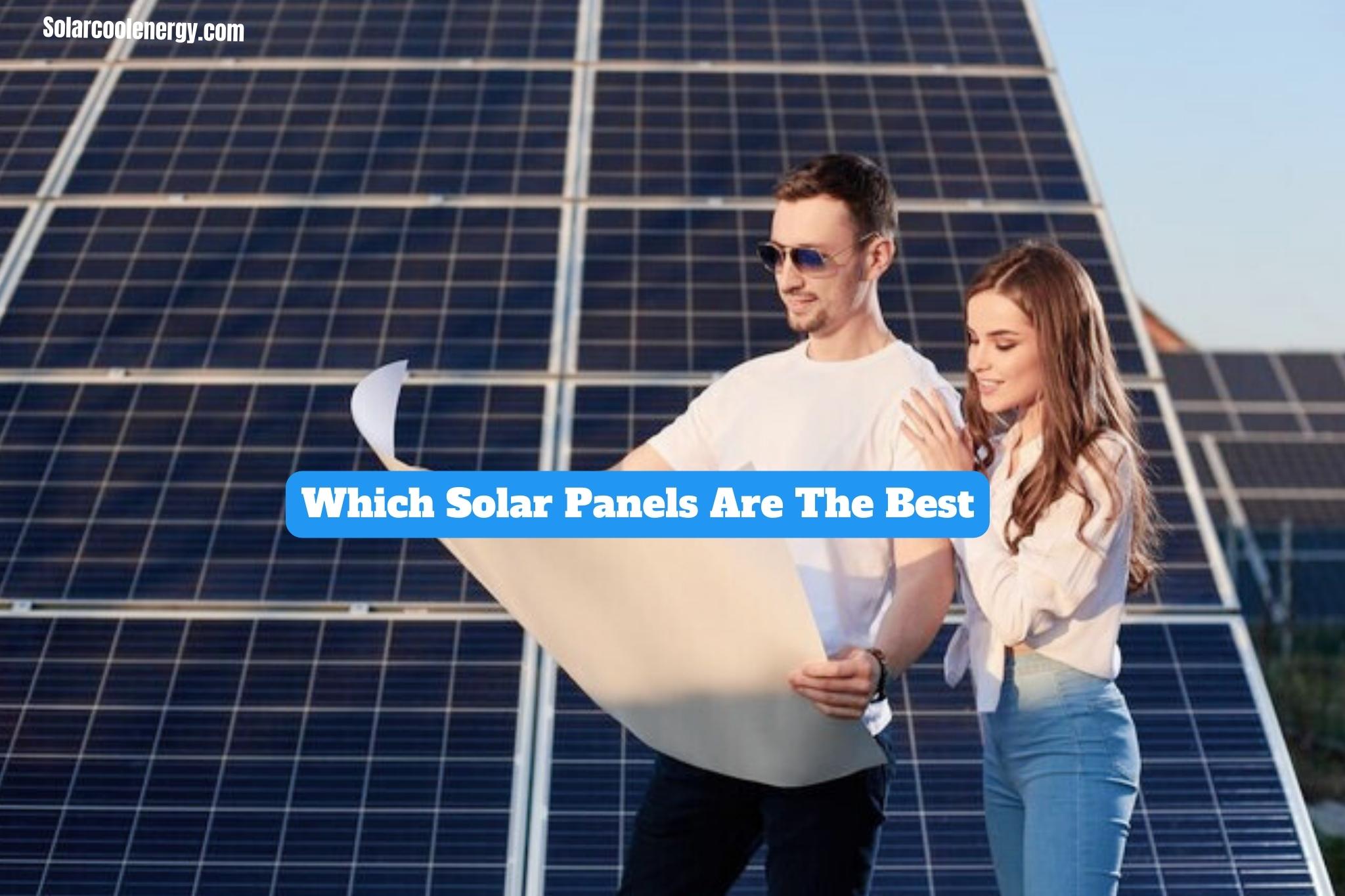Which Solar Panels Are The Best? The best solar panels are crystalline solar panels, which have the highest efficiency among all panel types. Crystalline solar panels offer the best power output and are ideal for homes with limited roof space.
Among the top brands in the market are Canadian Solar HiHero, SunPower M Series, REC Alpha Pure-R, and Panasonic EverVolt HK Black, each offering different advantages such as budget-friendly options, durability, and suitability for warm environments. Monocrystalline solar panels are also highly efficient and compact, making them a popular choice for residential installations.
Overall, when considering the best solar panel, it is important to prioritize factors such as efficiency, durability, and suitability for your specific environment.

Credit: Youtube
Assessing Solar Panel Efficiency
Solar panel efficiency can be assessed by considering the type of panel. Among all panel types, crystalline solar panels are considered the best due to their high efficiency and power output. Monocrystalline panels, in particular, offer the highest efficiency ratings and are suitable for homes with limited roof space.
Understanding efficiency ratings
One of the most important factors to consider when assessing solar panels is their efficiency rating. The capacity of a solar panel to convert sunlight into power is referred to as efficiency. The higher the efficiency rating, the more electricity the panel can produce for a given amount of sunlight.
When looking at efficiency ratings, it’s important to understand that not all solar panels are created equal. Different brands and types of panels may have varying levels of efficiency. It’s essential to compare and evaluate different options to determine which panels will provide the highest level of efficiency for your specific needs.
Comparing top brands by efficiency
When comparing solar panels, it’s helpful to look at the efficiency ratings of different brands. Some of the top brands known for their high-efficiency panels include Canadian Solar, SunPower, REC, and Panasonic. These brands have a track record of producing panels with excellent efficiency ratings that result in optimal power output.
| Brand | Efficiency Rating |
|---|---|
| Canadian Solar | 18-20% |
| SunPower | 22-24% |
| REC | 20-22% |
| Panasonic | 19-21% |
These brands consistently provide panels with high efficiency ratings, making them reliable choices for maximizing the electricity generation of your solar system.
Efficiency vs. real-world performance
While efficiency ratings are essential, it’s important to note that real-world performance may differ from these ratings. Factors such as temperature, shading, and installation angle can impact the actual performance of a solar panel system.
When assessing the efficiency of different panels, it’s crucial to consider their real-world performance in addition to their rated efficiency. Look for panels that have proven their performance in various conditions and have positive customer reviews.
In WordPress, the above HTML code can be used to include the engaging section of a blog post about “Which Solar Panels are the Best” focusing on the subheading “Assessing Solar Panel Efficiency”. This section provides insights into understanding efficiency ratings, comparing top brands by efficiency, and the importance of considering real-world performance when evaluating solar panels. The content is presented in an SEO-friendly manner, optimized for readability and relevance.

Credit: Amazon
Solar Panel Types Explained
Crystalline solar panels are considered to be the best type of solar panel due to their high efficiency. They offer the highest efficiency ratings and best power output, making them ideal for homes with limited roof space.
Monocrystalline Panels
Monocrystalline solar panels are widely considered to be the best in terms of efficiency. These panels are made using a single crystal structure, which allows for higher energy conversion rates. Due to their construction, monocrystalline panels have a sleek and uniform appearance, making them popular with homeowners looking for an aesthetically pleasing option. Additionally, these panels perform well in low-light conditions, making them suitable for areas with cloudy weather.
Polycrystalline Panels
Polycrystalline solar panels are another popular choice for residential and commercial installations. These panels are made using multiple silicon fragments or crystals, resulting in a textured appearance. While polycrystalline panels have a slightly lower efficiency compared to monocrystalline panels, they are more affordable and cost-effective. Polycrystalline panels are also known for their excellent performance in high-temperature environments, making them a suitable option for regions with hot climates.
Thin-film Technology
Thin-film solar panels are a newer technology that offers unique advantages. These panels are made by depositing layers of semiconductor materials onto a substrate, such as glass or metal. Thin-film panels are lightweight and flexible, allowing for easy installation on a variety of surfaces. They are also less affected by shading and perform better in high-temperature conditions compared to crystalline panels. However, thin-film panels have lower efficiency rates and require a larger surface area to generate the same amount of power as crystalline panels.
In conclusion, when choosing the best solar panel type, it is important to consider factors such as efficiency, cost, appearance, and performance in different environmental conditions. Monocrystalline panels offer the highest efficiency, while polycrystalline panels provide a cost-effective option. Thin-film panels are lightweight and flexible, but have lower efficiency rates. Ultimately, the best type of solar panel for your specific needs will depend on your budget, location, and desired performance.
Which Solar Panels Are The Best For Climatic Conditions
When it comes to determining the best solar panels for climatic conditions, it is important to consider factors such as efficiency, durability, and compatibility. Crystalline solar panels, specifically monocrystalline panels, are known to offer the highest efficiency ratings and best power output, making them ideal for various weather conditions.
Additionally, panels with a tough finish and foldable design provide improved durability and versatility.
When it comes to choosing the best solar panels for climatic conditions, there are a few key factors to consider. Analyzing the performance of solar panels in different weather conditions is crucial, as well as evaluating their durability and longevity.
Analyzing Performance In Different Weather
One of the most important aspects to consider when selecting solar panels for specific climatic conditions is how they perform in different weather conditions. Solar panels need to be able to generate electricity even in less-than-optimal weather conditions, such as cloudy or hazy days. This is where the efficiency rating of the panels comes into play. The higher the efficiency rating, the better the panels will perform under various weather conditions.
| Panel Type | Efficiency Rating |
|---|---|
| Monocrystalline | High |
| Polycrystalline | Moderate |
| Thin-Film | Low |
Monocrystalline solar panels have the highest efficiency rating, making them an excellent choice for areas with unpredictable weather patterns. They are able to generate electricity efficiently even in cloudy or shady conditions, ensuring consistent energy production.
Durability And Longevity Considerations
In addition to analyzing performance, it is important to consider the durability and longevity of solar panels when choosing the best option for specific climatic conditions. Solar panels are exposed to various weather elements, such as rain, snow, and high temperatures, which can potentially impact their lifespan.
When looking for solar panels that can withstand climatic conditions, it is recommended to choose panels made from high-quality materials and have excellent build quality. Some panels come with weather-resistant coatings and are designed to withstand extreme weather conditions, ensuring they can hold up well over time.
- Choose panels with a solid frame structure that can withstand heavy wind loads.
- Look for panels with a high snow load rating if you live in an area prone to heavy snowfall.
- Consider panels with a high temperature coefficient rating, indicating their ability to perform well even in hot climates.
By considering both performance in different weather conditions and durability factors, you can find the best solar panels that can withstand and thrive in your specific climatic conditions. Remember to compare the efficiency ratings, build quality, and additional features of different panels to make an informed decision.

Credit: amazon
Cost Versus Value In Solar Panels
When comparing solar panels, it’s important to consider the cost versus the value they provide. The best solar panels are those that offer high efficiency and power output, such as monocrystalline panels. These panels may cost more initially, but they offer long-lasting durability and can be a worthwhile investment in the long run.
Upfront Costs Compared
When it comes to choosing the best solar panels for your home or business, one of the key factors to consider is the upfront cost. Different types of solar panels come with varying price tags, and it’s important to evaluate the cost versus the value that each option provides.
Let’s take a look at the upfront costs compared among the different types of solar panels:
| Solar Panel Type | Average Upfront Cost |
|---|---|
| Monocrystalline | $5,400 |
| Poly-Crystalline | $3,119.99 |
| Thin-Film | $899.99 |
As seen in the table above, monocrystalline solar panels tend to have the highest upfront cost, followed by poly-crystalline and thin-film panels. However, it’s important to note that the upfront cost should not be the sole determining factor when evaluating the value of solar panels.
Long-term Savings Projections
While the upfront cost of solar panels may seem high, it’s essential to consider the long-term savings that solar energy can provide. Solar panels have the potential to significantly reduce or eliminate your electricity bill, resulting in substantial savings over time.
Here are some long-term savings projections based on an average residential solar panel system:
- Estimated savings over 20 years: $20,000
- Payback period: 6-8 years
- Return on investment (ROI): 10-12%
These projections showcase the value that solar panels can bring to your home or business. It’s important to consider the long-term financial benefits rather than focusing solely on the initial investment.
Incentives And Subsidies For Solar Investment
In addition to the long-term savings potential, there are also various incentives and subsidies available to encourage solar investment. These incentives can help offset the upfront cost and enhance the value of solar panels.
Here are some incentives and subsidies that you could potentially benefit from:
- Federal Investment Tax Credit (ITC): You may deduct a portion of the cost of your solar panel system from your federal taxes using this credit.
- State and local rebates: Many states and municipalities offer rebates or financial incentives for installing solar panels.
- Net Energy Metering (NEM): NEM allows you to receive credit for any excess electricity your solar panels generate, which can further reduce your electricity bills.
By taking advantage of these incentives and subsidies, you can further increase the value and return on investment of your solar panel system.
In conclusion, when evaluating the cost versus value in solar panels, it’s important to consider both the upfront costs and the long-term savings projections. Don’t forget to take into account the available incentives and subsidies that can enhance the value of solar investment. By thoroughly assessing these factors, you can make an informed decision and choose the solar panels that best meet your needs while maximizing your financial benefits.
Balance Of System For Optimal Performance
For optimal performance, the balance of system is crucial when choosing the best solar panels. Crystalline solar panels, particularly monocrystalline, are known for their high efficiency and power output, making them a top choice. Additionally, considering factors such as durability, compatibility, and warranty can help ensure the best results for your solar panel installation.
Importance Of Proper Installation
When it comes to solar panels, proper installation is crucial for optimal performance. A well-installed solar panel system ensures efficient energy production and maximizes the return on investment. An improper installation can lead to under performance, decreased energy output, and potential system failures.
During the installation process, it is important to consider factors such as the angle and orientation of the panels, shading, and proper wiring. These factors can significantly impact the overall performance of the solar panel system. Working with experienced professionals who understand the nuances of solar panel installation is essential to ensure that the system is set up correctly.
Compatibility With Existing Electrical Systems
Another key aspect to consider when choosing the best solar panels is their compatibility with existing electrical systems. This ensures a seamless integration and optimal performance of the solar panel system with the overall electrical infrastructure of the property.
Before installing solar panels, it is essential to assess the existing electrical system’s capacity and requirements. This includes evaluating the electrical load, the capacity of the circuit breakers, and any potential limitations. Ensuring compatibility between the solar panels and the existing electrical system minimizes the risk of electrical issues and ensures efficient energy production.
Maintenance And Scalability
Maintaining and scaling a solar panel system is another crucial consideration for optimal performance. Regular maintenance and inspection are necessary to keep the panels in top condition and maximize their lifespan. This includes cleaning the panels, checking for any damages or issues, and ensuring proper functioning.
Scalability is also an essential factor to consider, particularly for individuals or businesses planning to expand their solar panel system in the future. Choosing solar panels that allow for easy scalability and integration with additional panels ensures flexibility and the ability to meet increased energy demands.
In conclusion, to achieve optimal performance from solar panels, it is important to pay attention to the balance of system. Proper installation, compatibility with existing electrical systems, and maintenance and scalability are all critical factors in ensuring the best performance and return on investment from solar panels.
Diving Into Brand Reputation
When it comes to choosing the best solar panels for your home, it’s important to consider the brand reputation. By diving into a brand’s reputation, you can gain valuable insights into their customer satisfaction, industry recognition, warranties and service support, as well as their commitment to innovation and corporate sustainability. Let’s explore these factors further:
Customer Reviews And Industry Awards
Customer reviews and industry awards play a significant role in determining a brand’s reputation. By reading customer reviews, you can get a glimpse into the real-world experiences of those who have used the solar panels. Look for keywords like ‘reliable,’ ‘efficient,’ and ‘durable’ to gauge the overall satisfaction level.
Additionally, industry awards serve as a testament to a brand’s commitment to delivering high-quality and innovative products. Keep an eye out for brands that have received recognition from authoritative organizations in the solar energy industry. These awards validate a brand’s reputation and assure customers of their credibility.
Warranties And Service Support
A robust warranty and reliable service support are crucial factors to consider when evaluating a brand’s reputation. A comprehensive warranty offers peace of mind, ensuring that your investment in solar panels is protected against any manufacturing defects or performance issues.
Look for brands that offer extended warranties, covering not just the panels but also additional components such as inverters and racking systems. Furthermore, prompt and responsive service support is essential in case you encounter any issues with your solar panels. A brand that prioritizes customer satisfaction through efficient service support reflects their commitment to maintaining a strong reputation in the market.
Innovations And Corporate Sustainability
As the solar energy industry continues to evolve, innovation plays a pivotal role in brand reputation. Look for brands that are at the forefront of technological advancements in solar panel design and efficiency. This demonstrates their commitment to delivering cutting-edge solutions that maximize energy production and optimize performance.
Corporate sustainability is another crucial aspect to consider. Brands that prioritize sustainable manufacturing practices, use recyclable materials, and implement eco-friendly measures contribute to a greener future. By choosing a brand with a strong focus on corporate sustainability, you align yourself with their values and contribute to a cleaner environment.
In conclusion, by diving into a brand’s reputation, considering customer reviews, industry awards, warranties and service support, as well as their innovations and corporate sustainability efforts, you can make an informed decision about which solar panels are the best fit for your home. Remember, a brand’s reputation speaks volumes about their commitment to quality, reliability, and environmental responsibility.
Frequently Asked Questions For Which Solar Panels Are The Best
Which Is The Best Type Of Solar Panel?
Crystalline solar panels are the best type of solar panel. They have the highest efficiency and offer the best power output. Monocrystalline panels are especially efficient and work well on homes with limited roof space.
Which Is The Best Solar Panel In The Market?
The best solar panel in the market is subjective and depends on individual needs. However, some top-rated options include Canadian Solar Hi Hero for budget-friendly, Sun Power M Series for high performance, REC Alpha Pure-R for warm environments, and Panasonic Ever Volt HK Black for durability.
Monocry stalline panels are generally considered the most efficient.
Which Panel Is Best For Solar?
Crystalline solar panels, specifically monocrystalline panels, are the best for solar. They offer the highest efficiency and best power output among all panel types. Despite being more expensive, they are worth it due to their compact design and ability to work well on homes with limited roof space.
What Type Of Solar Panels Are Most Efficient?
Monocrystalline solar panels are the most efficient type, offering the highest efficiency and power output. They are compact and ideal for homes with limited roof space.
Conclusion
Based on various factors such as efficiency, durability, and price, it can be concluded that crystalline solar panels are the best option. They offer the highest efficiency ratings and provide the best power output. While they may cost more than other panel types, their long-lasting durability makes them a worthwhile investment.
When considering solar power, choosing the right type of panels is crucial for maximizing energy production and savings.

